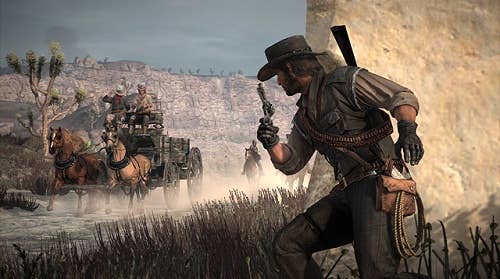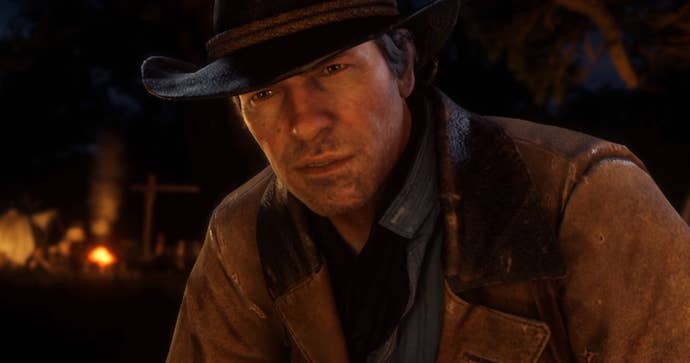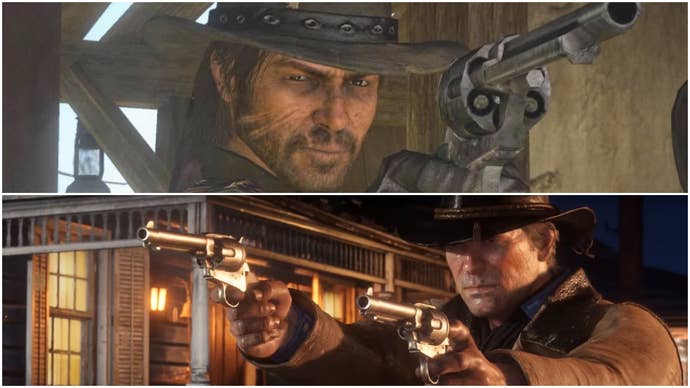Is Red Dead Redemption 2's Arthur Morgan More Evil Than John Marston, and Why it Doesn't Matter
Who's more evil John or Arthur?
This article first appeared on USgamer, a partner publication of VG247. Some content, such as this article, has been migrated to VG247 for posterity after USgamer's closure - but it has not been edited or further vetted by the VG247 team.
In Red Dead Redemption 2 players will get the chance to slip into the boots of Arthur Morgan, a violent, vicious member of Dutch's gang–the same gang John Marston was a part of. While we don't know yet if Marston will appear yet in Red Dead Redemption 2, players will live out Rockstar's playground version of the Wild West with Morgan, a protagonist not compromised by the familial ties that brought Marston to heel and made him into a "good man".
Everything we know about Morgan we know from the minute and half story trailer Rockstar released yesterday, and it doesn't paint a pretty picture. He shakes down debtors, robs banks, threatens a young man while talking about his dead dad and widowed mom. Basic outlaw stuff really, and nothing too unfamiliar in Rockstar's stable of thieves and killers, though fans have definitely taken notice that Morgan feels a shade darker than Marston was from the first Red Dead Redemption.
"I like that this time we are truly the bad guy it seems," says one of the highest rated comments on the nearly 1,000-plus comment long thread on the Red Dead Redemption subreddit for the new trailer.
It's a comment that's echoed across different threads, and seemingly the more popular revelation from the new trailer among fans. That this time players will get to play as an uncompromised outlaw, free of any frivolous morality. What's implied is that John Marston, another outlaw–albeit an ex-outlaw by the time the first Red Dead Redemption begins–wasn't bad enough guy. Something that feels weird to say considering he headlined a Rockstar game, a studio that specializes in bad guys. And guess what? John Marston is a bad guy.
Here's a thought experiment: If I played Red Dead Redemption 2 as peacefully as possible with Arthur Morgan, while I played as violently as possible as John Marston in Red Dead Redemption 1 (Dastardly achievement anyone?), who is the worse guy?

Regardless of any actions you commit in Rockstar's open worlds, if it doesn't fit with the game's narrative, it is rarely addressed. It's why the feds who are blackmailing John Marston won't question why I wandered into the cutscene with an NPC tied to the back of my horse. The dreaded "L-Word", Ludonarrative Dissonance comes to mind, and it's particularly interesting in the context of Rockstar games. Compared to a game like Saints Row, which not only gives you the tools to commit outrageous atrocities, but applauds those actions; Rockstar games like Red Dead Redemption and Grand Theft Auto tend to turn a blind eye towards actions that don't fit within the defined narrative for your charcter.
It's why John Marston is seen as a good man within the context of Red Dead Redemption. His story was an examination of the concept of redemption and past sins. That his son Jack follows in his father's shoes highlights the fact that redemption is rarely achieved. Evil is in some ways inherent to both John and Jack regardless of their actions, proving on some level that Jack, like his father, are bad men.
This raises some interesting questions about the legacy of Red Dead Redemption, and maybe even how players respond to questions of mortality in video games.

Does the ending to Red Dead Redemption supercede any potential "evil" actions as taken on by the player in the open world? If I played my John Marston as the most evil bastard in the west, does it matter if it's not part of the story? Likewise, would players prefer to play as a character whose evil actions are acknowledged by other characters in cutscenes? While we don't know much about Arthur Morgan just yet, he definitely seems like a nasty dude, as seen by the way other characters interact with him within the scenes in the trailer.
Morgan's purposeful villainy will certainly lead to more interesting storytelling possibilities that I'm excited to explore in Red Dead Redemption 2. But if I spend the whole game as peacefully as possible what difference does it make? Will Dutch ask me in-game, "Hey Arthur, you're usually this bad guy so why haven't you been bad lately?" if I go for an extended period of time not being "evil"? Probably not, and that comes with the territory. Rockstar does two things incredibly well: tell mature, sophisticated stories, and offer large sandboxes to play around in. The problem is that often time these two sides rarely communicate with each other.

So it seems weird that the idea of being the "bad guy" in a Rockstar game is exciting when one's cruelty or virtue is limited only by one's imagination and the technical limitations of any given title. Was Marston a good guy because the cinematic and story always positioned him in a better moral light, even when players were free to be as evil as they pleased? Do players need the story portions of the game to reaffirm the cruelty in our gameplay? Are John's evil actions outside of the story redeemed because of the way Red Dead Redemption ends?
These are largely rhetorical questions, but knowing Rockstar one can tell that the minute and half trailer doesn't offer a fraction of the full picture of what Red Dead Redemption 2 has to offer. Here's hoping that Rockstar's old west morality saga will play around with these concepts head-on. Lest they risk undermining Morgan's outwardly evil outlaw with its own gameplay, just like how the gameplay risked undermining John Marston's story of redemption.


